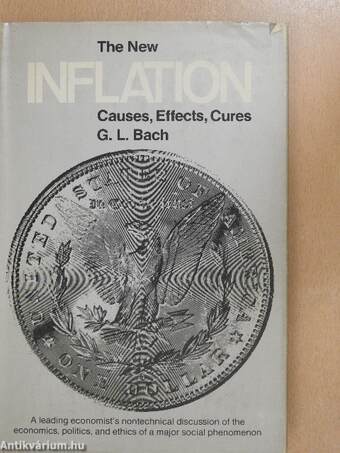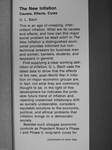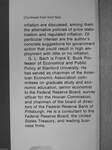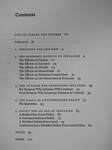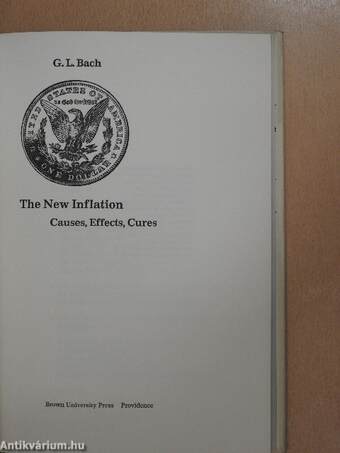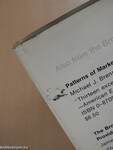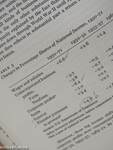1.062.411
kiadvánnyal nyújtjuk Magyarország legnagyobb antikvár könyv-kínálatát

VISSZA
A TETEJÉRE
JAVASLATOKÉszre-
vételek
The New Inflation
Causes, Effects, Cures
| Kiadó: | Brown University Press |
|---|---|
| Kiadás helye: | Providence |
| Kiadás éve: | |
| Kötés típusa: | Fűzött kemény papírkötés |
| Oldalszám: | 103 oldal |
| Sorozatcím: | |
| Kötetszám: | |
| Nyelv: | Angol |
| Méret: | 24 cm x 16 cm |
| ISBN: | 0-87057-136-2 |
naponta értesítjük a beérkező friss
kiadványokról
naponta értesítjük a beérkező friss
kiadványokról
Fülszöveg
The New Inflation
Causes, Effects, Cures
G. L. Bach
This is an age of creeping, intermittent inflation. What are its causes and effects, and how can this major social problem be dealt with? In The New Inflation a distinguished economist provides informed but nontechnical answers for business men and women, bankers, students, and taxpayers in general.
First supplying a clear working definition of inflation, G. L. Bach uses the latest data to show that the effects of the new, post-World War II inflation on major economic groups are, in fact, not what they are commonly thought to be. In the light of this development he indicates the probable future trend of inflation and, rejecting unplanned inflationary drift as socially undesirable, considers equitable solutions to the economic, political, and ethical problems that inflation brings to a democratic society.
Besides such stopgap economic controls as President Nixon's Phase I and Phase II, long-term cures for
[Continued on back... Tovább
Fülszöveg
The New Inflation
Causes, Effects, Cures
G. L. Bach
This is an age of creeping, intermittent inflation. What are its causes and effects, and how can this major social problem be dealt with? In The New Inflation a distinguished economist provides informed but nontechnical answers for business men and women, bankers, students, and taxpayers in general.
First supplying a clear working definition of inflation, G. L. Bach uses the latest data to show that the effects of the new, post-World War II inflation on major economic groups are, in fact, not what they are commonly thought to be. In the light of this development he indicates the probable future trend of inflation and, rejecting unplanned inflationary drift as socially undesirable, considers equitable solutions to the economic, political, and ethical problems that inflation brings to a democratic society.
Besides such stopgap economic controls as President Nixon's Phase I and Phase II, long-term cures for
[Continued on back flap]
[Continued from front flap]
inflation are discussed, among them the alternative policies of price stabilization and regulated inflation. Of particular interest are the author's concrete suggestions for government action that could result in high employment with little or no inflation.
G. L. Bach is Frank E. Buck Professor of Economics and Public Policy at Stanford University. He has served as chairman of the American Economic Association committees on graduate study and economic education, senior economist to the Federal Reserve Board, survey officer for the Hoover Commission, and chairman of the board of directors of the Federal Reserve Bank of Pittsburgh. He is a consultant to the Federal Reserve Board, the United States Treasury, and leading business firms. Vissza
Témakörök
- Közgazdaságtan > Gazdaságpolitika
- Közgazdaságtan > Általános > Makroökonómia
- Közgazdaságtan > Pénzügy > Egyéb
- Közgazdaságtan > Közgazdasági elméletek > Tőkés országok gazdasága
- Idegennyelv > Idegennyelvű könyvek > Angol > Közgazdaságtan > Gazdaságpolitika
- Idegennyelv > Idegennyelvű könyvek > Angol > Közgazdaságtan > Általános > Makroökonómia
- Idegennyelv > Idegennyelvű könyvek > Angol > Közgazdaságtan > Közgazdasági elméletek > Tőkés országok gazdasága
- Idegennyelv > Idegennyelvű könyvek > Angol > Közgazdaságtan > Pénzügy > Egyéb



